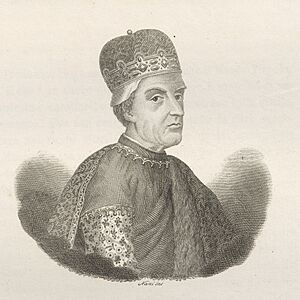Pietro Tradonico facts for kids
Quick facts for kids
Pietro Tradonico
|
|
|---|---|
 |
|
| 13th Doge of Venice | |
| In office 836–864 |
|
| Preceded by | Giovanni I Participazio |
| Succeeded by | Orso I Participazio |
| Personal details | |
| Born | c. 800 Istria, Carolingian Empire |
| Died | 13 September 864 Venice, Republic of Venice |
Pietro Tradonico (Latin: Petrus Tradonicus; c. 800 – 13 September 864) was an important leader of Venice, known as a Doge. He led Venice from 836 to 864. He was the 13th Doge, though some records count him as the 11th. His election was a big deal because it ended the strong influence of the Participazio family in Venice.
Contents
Pietro's Life and Leadership
Early Life and Skills
Pietro was born around 800 in Istria, a region near Venice. His family came from Pula and later moved to Rialto in Venice. He was a brave warrior, but he couldn't read or write. Because of this, he used a special mark to sign official papers.
Starting His Rule
When Pietro became Doge in 836, he tried to make his son, Giovanni, a co-leader. This was an attempt to make the Doge position something that stayed in one family, passed down from parent to child. However, like earlier attempts, this plan did not work out.
Fighting Pirates and Raiders
Pietro had to deal with many challenges during his time as Doge. He fought against Saracens, who were pirates from places like Bari and Taranto. These pirates had even defeated Venice in a battle near Sansego island.
He also faced problems with Slavs, especially the Narentines. In 839, he led a large fleet to punish the Narentines. They had attacked and killed several Venetian traders. Pietro made peace with Mislav, the Duke of the Croats in Dalmatia, and a Narentine prince named Družak.
However, his military attack on the Narentines in 840 failed. He lost many men and had to go back to Venice. The Narentines continued to cause trouble. In 846, they even managed to raid Caorle, a city in the Venetian lagoon.
Venice's Growing Power
In 840, something very important happened for Venice. The Carolingian Emperor Lothair I officially recognized Venice as independent. He also agreed that Venice had control over its lagoon and the nearby sea. The Byzantine Empire had already agreed to this. From the Byzantine Empire, Pietro received special titles like spatharius and hypatus. These titles showed his high status.
Important Visitors
In the spring of 856, Pietro and his son Giovanni welcomed Emperor Louis II and his wife Engelberga to Venice. The Emperor stayed for three days. During this visit, Emperor Louis II became the godfather to Giovanni's daughter. Her name is not known today.
End of His Rule
Giovanni, Pietro's son, died in 863. Pietro himself passed away a year later, on September 13, 864. He was attacked by a group of unhappy people while returning from church. Monks from the Church of San Zaccaria found his body and buried him in the church. Those who were responsible for his death were punished. Some were executed, and others were sent away to live in other countries. After Pietro's death, Orso Participazio became the new Doge. It is thought that Orso's rise to power was easier because Pietro no longer had an heir.
Sources
- Norwich, John Julius. A History of Venice. Alfred A. Knopf: New York, 1982.
| Political offices | ||
|---|---|---|
| Preceded by Giovanni I Participazio |
Doge of Venice 836–864 |
Succeeded by Orso I Participazio |
See also
 In Spanish: Pietro Tradonico para niños
In Spanish: Pietro Tradonico para niños
 | Frances Mary Albrier |
 | Whitney Young |
 | Muhammad Ali |

